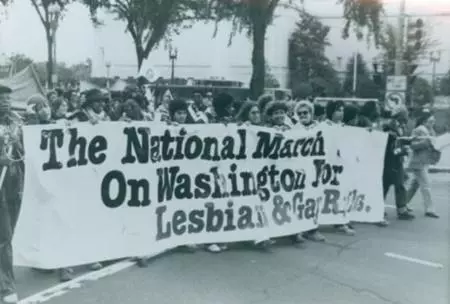
Harvey Milk was long considered to be the first openly gay person to be elected to political office. That is not true, and it is time to correct that.
Now 67, Kathleen "Kathy" Kozachenko rightly claims to have been elected before Harvey Milk and she is not the only one.
Nancy Wechsler and Jerry DeGrieck were elected to the city council in 1972 in Ann Arbor, Michigan. Both are gay and are officially recognized as the first LGBTQ officials elected in the United States. The only difference between them and Harvey Milk is that they only came out after they were elected.
It was on April 2, 1974, that the first openly gay person was elected. Her name is Kathy Kozachenko, and she is a 21-year-old lesbian studying English and Creative Writing at the University of Michigan and is passionate about radical activism.

She ran to join the Ann Arbor City Council under the local Human Rights Party and defeated her Democratic opponent by 52 votes.
“I really believed in the goals of the Human Rights Party and our mission for social justice,” Kozachenko said in an interview with NBC News, “so I wanted to see the organization remain alive, so I agreed to run.”
Thus, Kathy Kozachenko becomes the first openly gay person to be elected to political office in the United States.
“My campaign manager said to me, ‘Well since you’re running, why don’t we run you as an out lesbian?’” she recalled. “And I said, ‘Yeah, that sounds like a good idea.’”
In her victory speech, Kozachenko says:
“This is the first time in the history of the U.S. that someone has run openly as a gay person and been elected to public office.
“Gay liberation was not a major issue in the campaign — both candidates in this ward said they supported gay rights, but 10 years ago, or even three years ago, lesbianism would have meant automatic defeat.
“This year we talked about rent control. We talked about the city’s budget. We talked about police priorities, and we had a record of action to run on. Many people’s attitudes about gayness are still far from healthy, but my campaign forced some people at least to re-examine their prejudices and stereotypes.”

Less than one year after the election of Kozachenko, Elaine Noble was elected to an important position too, winning a seat in the Massachusetts House of Representatives.
Harvey Milk was then elected to the San Francisco Board of Supervisors three years later in 1977.
Kathy Kozachenko explains that she was left out of the history first because she is a woman and second because she is very private about her life.
After a two-year term in Ann Arbor, this quiet activist kept acting for the LGBTQ community.

First in New York, where she joined a group of gay and lesbian socialists while volunteering for the Dykes and Tykes.
“[Dykes and Tykes] was an organization that was helping women who had come out after having been married and had children, and their husbands were trying to take their kids away from them for being gay,” Kozachenko explains.

And then in Pittsburgh, where she still lives. There she recruited people for the 1979 National March on Washington for Lesbian & Gay Rights. The Pride March was the first major LGBTQ demonstration in the nation’s capital.
Of course, this detracts in any way from Harvey Milk’s contribution to LGBTQ rights and to the representation of the people of our community, but it is also important that all those who, like Kathy Kozachenko, led the way, regain their place in history.
Today, 855 political leaders in the United-States are LGBTQ people according to the Victory Institute, an organization that helps LGBTQ+ candidates in their campaigns.

Kathy Kozachenko with a photograph of her partner and her son
“I am so proud of all the activists that came after me,” Kozachenko said. “The people that pushed and pushed and pushed for gay marriage, the transgender people that have pushed for their rights and for the understanding of who they are. I think none of this would have happened without the energy and activism of many, many people not giving up, and I’m very grateful for that, and I’m grateful for the chance that I was able to play a small part in this.”
Photo 1 from the Human Rights Party records/Bentley Historical Library, University of Michigan
Last photo by Chris Goodney -Bloomberg via Getty Images
Comments